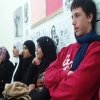All the country's municipalities, apart from four, have students who are enrolled in secondary education for young people with special needs. And the four municipalities outside students in the program have resources to offer youth training if there are young people in the target group that caters. Municipalities thus offers now training courses are aimed at young people's interests and assumptions, which may give young people skills to such an independent adult life as possible. It shows an evaluation of the youth program, which is implemented in the spring of 2009. On 28 February 2009, 1,965 young people in a youth education for young people with special needs, while only 1,339 young people were doing training on 1 August 2008. It will say that there has been an increase of about 47 percent. According to the regional development council expects the municipalities to continue to increase in the 2009/2010 school year.
Employment objective
The purpose of secondary education is that young people acquire the personal, social and professional skills for such an independent and active participation in adult life and, if possible to education and employment. A review of 100 training shows that the 71 employed as a primary educational goals. 63 training plans have primary target within the topic personal development. Housing (botræning, clarification of possibilities for independent housing), leisure activities, improvement of basic educational skills and ADL subjects (Ordinary Daily Habits) is included as educational goals in about half of the plans. The evaluation showing that the training plans for young people who are enrolled in secondary education for young people with special needs, largely follows the primary purpose of which is described in the law. In the coming year, the Ministry of Education gather and disseminate good examples of training, prepare a ministerial guidance and embark on a new round of evaluations, focusing among other things, is the content of curricula and provider basis.
Facts
Law on secondary education for young people with special needs (Law no. 564 of 6 June 2007) entered into force on 1 August 2007. The law provides young people with disabilities and other young people with special needs, who are not able to complete secondary attainment a legal right to a three-year youth education process prepared individually from the young person's qualifications, maturity and interests. The municipal authority has the responsibility to provide education to the young residents of the municipality. The target group for youth education is mentally disabled young people and other young people with special needs who can not complete secondary school, even with the extra educational support. The group of other young people with special needs include young people with severe motor disabilities, multiple disabilities, young people with autism, ADHD or other mental disorders as well as young people with acquired brain injury. The Act provides for that in the training plan may include elements from day schools, boarding schools (especially organized courses for students who have completed primary school), folk high schools, home schools, trade schools, production schools, vocational schools (elements of business education, but not all programs) and other institutions and workshops. Other institutions and workshops in this context both private and public and possibly social institutions, which can be organized courses with internships, practical activities and training, for example botræning.
Source: Ministry of Education 


